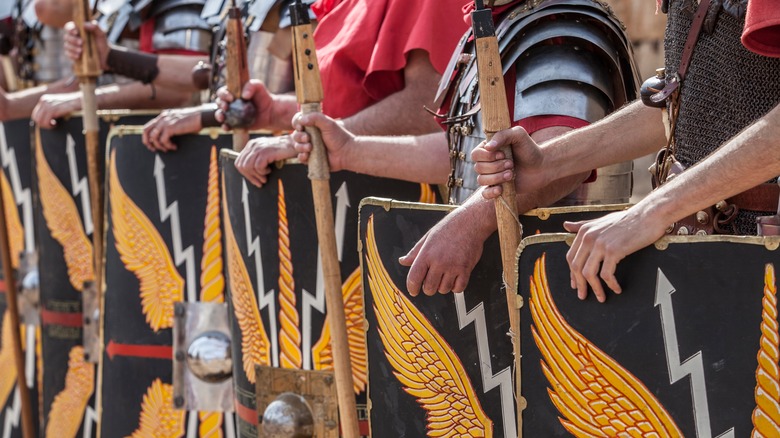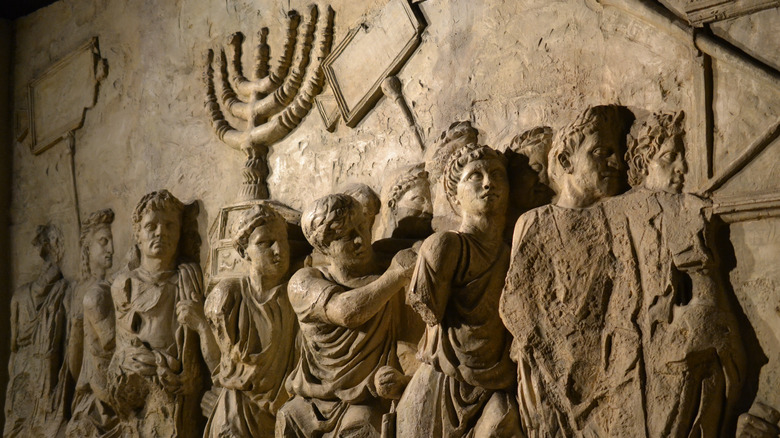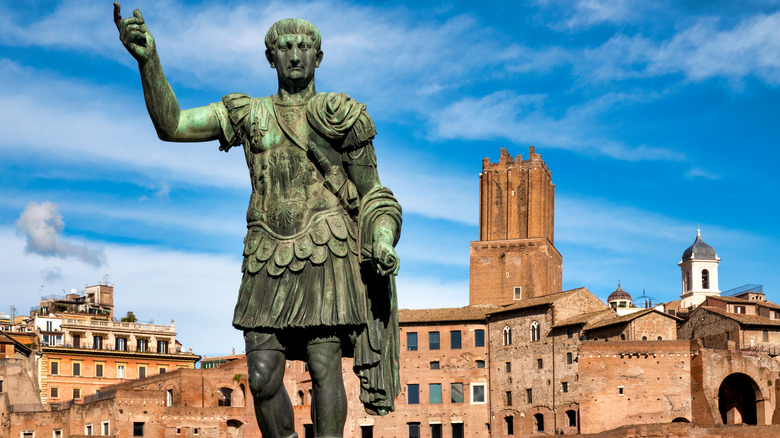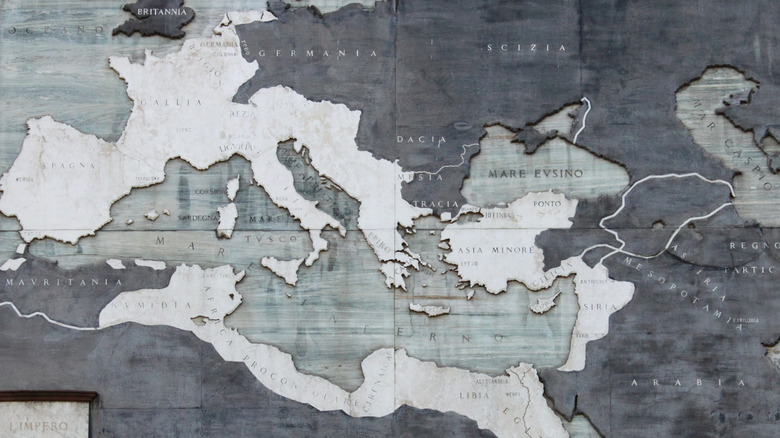How The Kitos War Reignited Conflict Between The Jewish Community And Rome
Warfare has a way of making all parties guilty, regardless of causes or ideologies. One side attacks, the other attacks back, and before you know it you've got things like the Gaza Strip: a generational back-and-forth of endless bloodshed, acrimony, and recriminations. In rare cases only, like the Nazi Party in World War II, do we come as close as possible to the kind of "good guys vs. bad guys" tale that every society wants to tell itself to justify suffering.
To the world's Jews, these words should resonate especially strongly. The Babylonian Exile circa 597 BCE (via the Jewish Virtual Library), the eventual diaspora across Europe following the Roman occupation of the Kingdom of Judea in the 1st century CE (via PBS), countless disturbing and disgusting anti-Semitic prejudices like medieval Blood Libel tales of Jews kidnapping and sacrificing Christian children (via Chabad), all the way up to the Holocaust before the founding of Israel: Yes, Jewish theology regarding suffering and the nature of humanity seems to be on point (via the Jewish Virtual Library).
One particular vignette from Jewish history teaches us lots of about violence, war, and where to draw the line regarding peaceful co-existence with one's neighbors. This event, the Second Jewish-Roman war, aka the Kitos War, pitted Roman Jews against the Roman Empire. It was crushed after a mere two years and left nothing behind but death.
The changing hands of conquerors
To get a handle on the Kitos War and the conditions surrounding it, we've got to sprint through a whole bunch of Jewish history. Debate is still up in the air regarding how, when, and if historical records regarding ancients Jews square with Biblical accounts. But, as My Jewish Learning says, the first extra-Biblical reference to Jewish people comes from about 1,500 years ago in Egypt, indicating that Jews had arrived in modern-day Palestine prior to then.
Fast-forward to the death of King Solomon (between 926 and 922 BCE), and Israel split into two kingdoms: Israel in the north, and Judah in the south, as the Jewish Virtual Library explains. In 722 BCE the Assyrians conquered Israel, and its Jewish population scattered in a kind of proto-diaspora. Come 701 BCE, the Assyrians started eyeing Judah, too, but by 625 BCE the Babylonians conquered it first and banished Judah's education population. This event, the Babylonian Exile, broke the dynasty of David and ended in 538 BCE when the Persian emperor Cyrus the Great conquered the region and invited the banished Jews back (also via the Jewish Virtual Library). Alexander the Great rolled into town around 328 BCE, and then the Romans in the 2nd century BCE. By 6 CE (per the BBC), Judah became the Roman province of Judea. From there, it took only 60 years for tensions between the Roman Empire and its Jews to turn violent.
The first of three revolts
If things turn physically violent between a population and their government, you know that anger's been brewing for quite some time. Such was the case with the Jews in the Roman province of Judea. Even before Judea officially became a province in 6 CE, it had been a tributary starting from 57 BCE to 55 BCE (via My Jewish Learning). Its government had been reorganized and restructured according to Roman standards, and the region was split into different administrative centers.
By the time we get to the first century CE, Judea was undergoing something of an economic boom because of its Roman occupation, as PBS explains. At the same time, Judaism itself was fracturing into different sects centered around the Second Temple in Jerusalem, particularly as related to doctrine regarding the expected apocalypse. "Bandit rebel" figures like Judas the Galilean, who led a resistance against Rome because of Rome's tax-collecting census (via Livius), exacerbated tensions all around.
In 66 CE, an all-out insurrection broke out when someone, vilely so, emptied a pot of urine outside of a synagogue (via the BBC). The Roman governor Florus demanded that the perpetrator be handed over, and when the person couldn't be identified, he ordered Roman troops to massacre people in the marketplace. Jews resisted, and over 40,000 were killed. By 70 CE, four years into a sustained rebellion, the Second Temple was destroyed by Emperor Vespasian's son, Titus, and its sacred contents looted. Thus the rebellion ended.
Igniting the Kitos War
After the destruction of the Second Temple of Jerusalem ended what became known as the First Jewish-Roman War, a couple of generations passed in relative peace. After Emperor Trajan took the throne in 98 CE, he made military conquest and border patrol his priority. Under Trajan, the Roman Empire reached its biggest size, from Scotland in the north down through Northern Africa and out through the Middle East, as National Geographic describes.
Come 115 CE, two years before Trajan's death, he turned his attention to the Parthian Empire, an old Roman nemesis and vassal. To do so, he had to cross the Taurus Mountains in southern Turkey and descend into the Parthian Empire in modern-day Iraq. That same year, he conquered the Parthian capital, Ctesiphon, and expanded the boundaries of the Roman empire all the way to the Persian Gulf (via PBS).
Discontent must have been brewing back at home, because when Trajan set out on this campaign, Jews in the empire revolted. This wasn't a piecemeal effort, either, and it didn't start in Judea. As Omniatlas depicts, simultaneous and seemingly orchestrated revolts broke out across the empire in June and July of 115, beginning with the Jewish community in Cyrene in modern-day Libya, west of Egypt. There, Jews destroyed Roman temples and killed both Romans and Greeks, as Heritage History explains. Jews in Mesopotamia joined in, and later Egypt, Alexandria, the island of Cyprus, Judea itself, and more.
Rebellions across the empire
Here we run up against a familiar moral conundrum: If the oppressed rise up and murder, loot, and so forth — effectively taking on the role of their presumed oppressors — how far can we still extend sympathies to them? In the case of the Kitos War, folks could say, "The Romans had it coming" as easily as others say, "The Jews had the Roman retaliation coming." And retaliate Rome did. In the end, the Second Jewish-Roman War, aka the Kitos War, lasted a scant two years, from 115 to 117. It reignited a conflict that had simmered down, and made life harder for Jewish people, anyway.
On the surface, the phrase "rebellions across the empire" might conjure visions of well-armed, well-organized militants storming across the landscape. In reality, despite being so widespread, and also apparently orchestrated, each conflict between Jews and Romans was closer to a city riot than a disciplined assault, as Heritage History describes. Jewish populations went on a rampage, local governments asked for Trajan for help, Trajan raised an army, and Trajan — of course — crushed the rebellion. It was the Roman army, after all. What would "victory" even look like in the middle of the empire?
Omniatlas goes into detail about various Kitos War engagements. In Artemion's Rebellion on Cyprus, for instance, Jews were reportedly responsible for 240,000 deaths. After that, they were banished from the island forever. Jews in Mesopotamia were killed before they had a chance to rebel.
The never-ending war
The Kitos War wasn't the last of its kind. In 132 CE, only 15 years after the Kitos War ended, the Third Jewish-Roman War, aka "Bar Kokhba's Revolt," broke out. Bar Kokhba's Revolt was a major uprising on par with the First Jewish-Roman War — organized, focused, and at least at first, surprisingly successful, as World History says. Most importantly, as sites like Heritage History add, it was driven by true religious zeal. The whole thing started in Palestine following a Roman edict outlawing circumcision, and gained steam under the belief that a man named Bar Kochba was the promised messiah. Add to this the belief that the apocalypse was nigh, and you've got a recipe for violent disaster.
And what do you figure happened next? The Romans, apparently fed up with the whole, cyclical Jewish rebellion thing, struck back harder than ever in a "scorched Earth" policy. They absolutely marauded the Jewish communities in the empire, killing, pillaging, enslaving, and exiling until Palestine was a wasteland. They were so thorough, so effective, that it took all the way to the creation of Israel in 1948 for the world's Jews to have a designated home again.
What's the lesson here? In retrospect, it's easy for us finger-point and blame all sides, or cite phrases like "love thy neighbor" and "turn the other cheek" out of historical context. But those who lived through the Kitos War and other Jewish rebellions? They're the ones who gave us these lessons.





